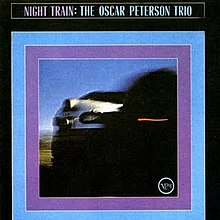Night Train (Oscar Peterson album)
| Night Train | ||||
|---|---|---|---|---|
 | ||||
| Studio album by The Oscar Peterson Trio | ||||
| Released | 1963 | |||
| Recorded | December 15 & 16, 1962 | |||
| Venue | Los Angeles, California | |||
| Genre | Jazz | |||
| Length | 67:40 (1997 CD re-release) | |||
| Label | Verve | |||
| Producer | Norman Granz | |||
| The Oscar Peterson Trio chronology | ||||
| ||||
Night Train is an album by the Oscar Peterson Trio, released in 1963 by Verve Records.
Background
Album producer Norman Granz had sold the record label Verve, but remained Peterson's manager, and so supervised the Night Train recording session. The brief duration of many of the tracks has been attributed to a desire to have them played on commercial radio, which was reluctant to play any tracks longer than a few minutes.
The cover art photograph is by Pete Turner[1] and original sleeve notes were by Benny Green.
Music and recording
On the title track,
After the opening theme choruses, Peterson slips into a 2-chorus solo. Then the theme returns, and we realize that all the while, the band has gotten softer and softer. This leads into Brown's solo, which is unaccompanied to start, and then adds, in turn, Peterson and Thigpen. When Peterson comes in for another chorus of solo, everything starts to build again. Peterson plays a boogie figure in the bass to build the intensity, and then the trio plays a simple but effective shout chorus and then goes back to the theme with a strong crescendo to nearly the end, with a traditional Count Basie tag to close the track. By using the basic elements of crescendo and diminuendo, and arranged sections to set off the parts, Peterson turns what could have been a throwaway into a minor masterpiece.[2]
Ed Thigpen's rivet cymbal, recorded at very close range, is prominent on all issues of the album.[3]
Reception
| Review scores | |
|---|---|
| Source | Rating |
| AllMusic | |
| The Rolling Stone Jazz Record Guide | |
| Encyclopedia of Popular Music | |
Writing for AllMusic, critic John Bush wrote the release "includes stately covers of blues and R&B standards".[7] The Penguin Guide to Jazz included it in its core collection, claiming "it's one of the best long-players of the period"[8] and that Peterson's playing is "tight and uncharacteristically emotional".[8]
In 2019, the album was named as the jury winner of the Polaris Heritage Prize.[9]
Influence
Diana Krall reported that listening to the album made being a jazz pianist her ambition.[2]
Track listing
| No. | Title | Writer(s) | Length |
|---|---|---|---|
| 1. | "Night Train" | Jimmy Forrest, Lewis Simpkins, Oscar Washington | 4:52 |
| 2. | "C Jam Blues" | Barney Bigard, Ellington | 3:26 |
| 3. | "Georgia on My Mind" | Hoagy Carmichael, Stuart Gorrell | 3:46 |
| 4. | "Bags' Groove" | Milt Jackson | 5:43 |
| 5. | "Moten Swing" | Bennie Moten | 2:55 |
| 6. | "Easy Does It" | Sy Oliver, Trummy Young | 2:45 |
| No. | Title | Writer(s) | Length |
|---|---|---|---|
| 7. | "Honey Dripper" | Joe Liggins | 2:24 |
| 8. | "Things Ain't What They Used to Be" | Mercer Ellington, Ted Persons | 4:38 |
| 9. | "I Got It Bad (and That Ain't Good)" | Ellington, Paul Francis Webster | 5:08 |
| 10. | "Band Call" | Ellington | 3:55 |
| 11. | "Hymn to Freedom" | Oscar Peterson | 5:38 |
| No. | Title | Writer(s) | Length |
|---|---|---|---|
| 12. | "Happy Go Lucky Local (A.K.A. Night Train) (alternate take)" | Ellington | 5:00 |
| 13. | "Volare" | Franco Migliacci, Domenico Modugno, Mitchell Parish | 2:49 |
| 14. | "My Heart Belongs to Daddy" | Cole Porter | 3:57 |
| 15. | "Moten Swing (rehearsal take)" | Bennie Moten | 3:36 |
| 16. | "Now's the Time" | Charlie Parker | 2:36 |
| 17. | "This Could Be the Start of Something" | Steve Allen | 5:11 |
(Tracks 12 through 17 are CD bonus tracks, not included on the original vinyl LP)
Personnel
Technical personnel
- Norman Granz – production
- Val Valentin – recording engineering
- Pete Turner – cover photography
- Benny Green - sleeve notes
References
- ^ "Album Cover Art - Oscar Peterson Trio - Night Train". Tralfaz-archives.com. Retrieved 17 November 2015.
- ^ a b Cunniffe, Thomas "Oscar Peterson: Night Train" Archived 2015-07-01 at the Wayback Machine. jazz.com. Retrieved June 30, 2015.
- ^ Katz, Dick (December 1996) [CD booklet in 1997 Verve re-issue]
- ^ Yanow, Scott. "Night Train > Review". AllMusic. Retrieved December 21, 2017.
- ^ Swenson, J., ed. (1985). The Rolling Stone Jazz Record Guide. USA: Random House/Rolling Stone. p. 161. ISBN 0-394-72643-X.
- ^ Larkin, Colin (2007). Encyclopedia of Popular Music (4th ed.). Oxford University Press. ISBN 978-0195313734.
- ^ Bush, John. "Night Train > Review". AllMusic. Retrieved June 2, 2015.
- ^ a b Cook, Richard and Morton, Brian (2008) The Penguin Guide to Jazz Recordings (9th ed.), Penguin, p. 1153.
- ^ Karen Bliss, "D.O.A. and Oscar Peterson Win Polaris Heritage Prize for Classic Albums". Billboard, November 5, 2019.
